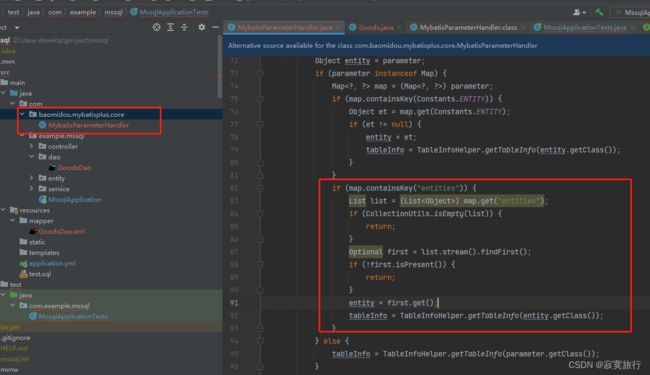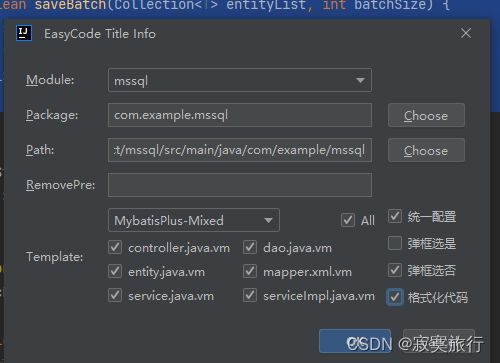mybatis/mp批量插入非自增主键数据
文章目录
- 前言
- 一、mp的批量插入是假的
- 二、真正的批量插入
-
- 1.利用sql注入器处理
- 2.采用自编码,编写xml批量执行
-
- 生成内容如下:
- 三 问题
-
- 问题描述
- 问题原因
- 问题解决
-
- 粘贴一份,兼容集合
- 替换原有文件
- 总结
-
-
-
- 自增与非自增区别:
-
-
前言
mybatis/mp 在实际开发中是常用的优秀持久层框架,但是在非自增主键的时候,单条数据插入式可以的,当批量插入的时候,如何做到填充主键呢?
这里的批量插入是指执行真正的批量插入!
一、mp的批量插入是假的
mp中细心的小伙伴会发现,批量插入是假的,以下是mybatis-plus的源码
public boolean saveBatch(Collection<T> entityList, int batchSize) {
String sqlStatement = this.getSqlStatement(SqlMethod.INSERT_ONE);
return this.executeBatch(entityList, batchSize, (sqlSession, entity) -> {
sqlSession.insert(sqlStatement, entity);
});
}
问题就出在这里: 循环调用的insert方法,不是insert into values
我想做的是做一个真正的批量执行,然后插入,但是问题是,当插入的时候,非自增主键没有被填充!!!
二、真正的批量插入
1.利用sql注入器处理
可以参考我的另一篇文章实现mybatis-plus 批量插入修改
2.采用自编码,编写xml批量执行
生成内容如下:
- mapper/dao
/**
* 批量新增数据(MyBatis原生foreach方法)
*
* @param entities List 实例对象列表
* @return 影响行数
*/
int insertBatch(@Param("entities") List<Goods> entities);
- xml
<insert id="insertBatch" keyProperty="id">
insert into dbo.goods(id,name, code, price)
values
<foreach collection="entities" item="entity" separator=",">
(#{entity.id},#{entity.name}, #{entity.code}, #{entity.price})
foreach>
insert>
这就能直接调用生成的 insertBatch 去执行真正的批量执行了!
三 问题
问题描述
虽然如上两种实现了批量插入,但是都有问题, 批量插入无法生成id,导致插入失败,因为主键不能为空
问题原因
经过不断 断点 跟踪mybatis执行,发现在 MybatisParameterHandler 中,如下代码有问题:
private void process(Object parameter) {
if (parameter != null) {
TableInfo tableInfo = null;
Object entity = parameter;
if (parameter instanceof Map) {
Map<?, ?> map = (Map)parameter;
if (map.containsKey("et")) {
Object et = map.get("et");
if (et != null) {
entity = et;
tableInfo = TableInfoHelper.getTableInfo(et.getClass());
}
}
} else {
tableInfo = TableInfoHelper.getTableInfo(parameter.getClass());
}
if (tableInfo != null) {
MetaObject metaObject = this.configuration.newMetaObject(entity);
if (SqlCommandType.INSERT == this.sqlCommandType) {
this.populateKeys(tableInfo, metaObject, entity);
this.insertFill(metaObject, tableInfo);
} else {
this.updateFill(metaObject, tableInfo);
}
}
}
}
其中问题为:
if (parameter instanceof Map) {
Map<?, ?> map = (Map)parameter;
if (map.containsKey("et")) {
Object et = map.get("et");
if (et != null) {
entity = et;
tableInfo = TableInfoHelper.getTableInfo(et.getClass());
}
}
} else {
tableInfo = TableInfoHelper.getTableInfo(parameter.getClass());
}
此处
map.containsKey("et")不对,因为我这里是批量插入,传入的不是et,就算我把参数名称改为et也不行
因为我是批量执行,这里获取到的应该是一个集合,list
但是这里是按照一个对象处理的TableInfoHelper.getTableInfo(et.getClass())
所以一直获取不到tableInfo ,导致后续无法执行填充主键逻辑
问题解决
思路:
- 将MybatisParameterHandler 重新粘贴一份,然后修改上述的问题,增加判断逻辑,处理集合;
- 将当前的文件替换原有文件,使得mybatis执行的时候,走我这份文件即可(覆盖之前不兼容集合的文件)
粘贴一份,兼容集合
package com.baomidou.mybatisplus.core;
import com.baomidou.mybatisplus.annotation.IdType;
import com.baomidou.mybatisplus.core.incrementer.IdentifierGenerator;
import com.baomidou.mybatisplus.core.metadata.TableInfo;
import com.baomidou.mybatisplus.core.metadata.TableInfoHelper;
import com.baomidou.mybatisplus.core.toolkit.*;
import org.apache.ibatis.executor.ErrorContext;
import org.apache.ibatis.executor.parameter.ParameterHandler;
import org.apache.ibatis.mapping.*;
import org.apache.ibatis.reflection.MetaObject;
import org.apache.ibatis.session.Configuration;
import org.apache.ibatis.type.JdbcType;
import org.apache.ibatis.type.TypeException;
import org.apache.ibatis.type.TypeHandler;
import org.apache.ibatis.type.TypeHandlerRegistry;
import java.sql.PreparedStatement;
import java.sql.SQLException;
import java.util.*;
/**
* @author fulin
* @since 2023/9/20 17:38
*/
public class MybatisParameterHandler implements ParameterHandler {
private final TypeHandlerRegistry typeHandlerRegistry;
private final MappedStatement mappedStatement;
private final Object parameterObject;
private final BoundSql boundSql;
private final Configuration configuration;
private final SqlCommandType sqlCommandType;
public MybatisParameterHandler(MappedStatement mappedStatement, Object parameter, BoundSql boundSql) {
this.typeHandlerRegistry = mappedStatement.getConfiguration().getTypeHandlerRegistry();
this.mappedStatement = mappedStatement;
this.boundSql = boundSql;
this.configuration = mappedStatement.getConfiguration();
this.sqlCommandType = mappedStatement.getSqlCommandType();
this.parameterObject = processParameter(parameter);
}
public Object processParameter(Object parameter) {
/* 只处理插入或更新操作 */
if (parameter != null
&& (SqlCommandType.INSERT == this.sqlCommandType || SqlCommandType.UPDATE == this.sqlCommandType)) {
//检查 parameterObject
if (ReflectionKit.isPrimitiveOrWrapper(parameter.getClass())
|| parameter.getClass() == String.class) {
return parameter;
}
Collection<Object> parameters = getParameters(parameter);
if (null != parameters) {
// 感觉这里可以稍微优化一下,理论上都是同一个.
parameters.forEach(this::process);
} else {
process(parameter);
}
}
return parameter;
}
@Override
public Object getParameterObject() {
return this.parameterObject;
}
private void process(Object parameter) {
if (parameter != null) {
TableInfo tableInfo = null;
Object entity = parameter;
if (parameter instanceof Map) {
Map<?, ?> map = (Map<?, ?>) parameter;
if (map.containsKey(Constants.ENTITY)) {
Object et = map.get(Constants.ENTITY);
if (et != null) {
entity = et;
tableInfo = TableInfoHelper.getTableInfo(entity.getClass());
}
}
if (map.containsKey("entities")) {
List list = (List<Object>) map.get("entities");
if (CollectionUtils.isEmpty(list)) {
return;
}
Optional first = list.stream().findFirst();
if (!first.isPresent()) {
return;
}
entity = first.get();
tableInfo = TableInfoHelper.getTableInfo(entity.getClass());
}
} else {
tableInfo = TableInfoHelper.getTableInfo(parameter.getClass());
}
if (tableInfo != null) {
//到这里就应该转换到实体参数对象了,因为填充和ID处理都是争对实体对象处理的,不用传递原参数对象下去.
MetaObject metaObject = this.configuration.newMetaObject(entity);
if (SqlCommandType.INSERT == this.sqlCommandType) {
populateKeys(tableInfo, metaObject, entity);
insertFill(metaObject, tableInfo);
} else {
updateFill(metaObject, tableInfo);
}
}
}
}
protected void populateKeys(TableInfo tableInfo, MetaObject metaObject, Object entity) {
final IdType idType = tableInfo.getIdType();
final String keyProperty = tableInfo.getKeyProperty();
if (StringUtils.isNotBlank(keyProperty) && null != idType && idType.getKey() >= 3) {
final IdentifierGenerator identifierGenerator = GlobalConfigUtils.getGlobalConfig(this.configuration).getIdentifierGenerator();
Object idValue = metaObject.getValue(keyProperty);
if (StringUtils.checkValNull(idValue)) {
if (idType.getKey() == IdType.ASSIGN_ID.getKey()) {
if (Number.class.isAssignableFrom(tableInfo.getKeyType())) {
metaObject.setValue(keyProperty, identifierGenerator.nextId(entity));
} else {
metaObject.setValue(keyProperty, identifierGenerator.nextId(entity).toString());
}
} else if (idType.getKey() == IdType.ASSIGN_UUID.getKey()) {
metaObject.setValue(keyProperty, identifierGenerator.nextUUID(entity));
}
}
}
}
protected void insertFill(MetaObject metaObject, TableInfo tableInfo) {
GlobalConfigUtils.getMetaObjectHandler(this.configuration).ifPresent(metaObjectHandler -> {
if (metaObjectHandler.openInsertFill()) {
if (tableInfo.isWithInsertFill()) {
metaObjectHandler.insertFill(metaObject);
} else {
// 兼容旧操作 id类型为input或none的要用填充器处理一下
if (metaObjectHandler.compatibleFillId()) {
String keyProperty = tableInfo.getKeyProperty();
if (StringUtils.isNotBlank(keyProperty)) {
Object value = metaObject.getValue(keyProperty);
if (value == null && (IdType.NONE == tableInfo.getIdType() || IdType.INPUT == tableInfo.getIdType())) {
metaObjectHandler.insertFill(metaObject);
}
}
}
}
}
});
}
protected void updateFill(MetaObject metaObject, TableInfo tableInfo) {
GlobalConfigUtils.getMetaObjectHandler(this.configuration).ifPresent(metaObjectHandler -> {
if (metaObjectHandler.openUpdateFill() && tableInfo.isWithUpdateFill()) {
metaObjectHandler.updateFill(metaObject);
}
});
}
/**
* 处理正常批量插入逻辑
*
* org.apache.ibatis.session.defaults.DefaultSqlSession$StrictMap 该类方法
* wrapCollection 实现 StrictMap 封装逻辑
*
*
* @return 集合参数
*/
@SuppressWarnings({"rawtypes", "unchecked"})
protected Collection<Object> getParameters(Object parameterObject) {
Collection<Object> parameters = null;
if (parameterObject instanceof Collection) {
parameters = (Collection) parameterObject;
} else if (parameterObject instanceof Map) {
Map parameterMap = (Map) parameterObject;
if (parameterMap.containsKey("collection")) {
parameters = (Collection) parameterMap.get("collection");
} else if (parameterMap.containsKey("list")) {
parameters = (List) parameterMap.get("list");
} else if (parameterMap.containsKey("array")) {
parameters = Arrays.asList((Object[]) parameterMap.get("array"));
}
}
return parameters;
}
@Override
@SuppressWarnings("unchecked")
public void setParameters(PreparedStatement ps) {
ErrorContext.instance().activity("setting parameters").object(this.mappedStatement.getParameterMap().getId());
List<ParameterMapping> parameterMappings = this.boundSql.getParameterMappings();
if (parameterMappings != null) {
for (int i = 0; i < parameterMappings.size(); i++) {
ParameterMapping parameterMapping = parameterMappings.get(i);
if (parameterMapping.getMode() != ParameterMode.OUT) {
Object value;
String propertyName = parameterMapping.getProperty();
if (this.boundSql.hasAdditionalParameter(propertyName)) { // issue #448 ask first for additional params
value = this.boundSql.getAdditionalParameter(propertyName);
} else if (this.parameterObject == null) {
value = null;
} else if (this.typeHandlerRegistry.hasTypeHandler(this.parameterObject.getClass())) {
value = parameterObject;
} else {
MetaObject metaObject = this.configuration.newMetaObject(this.parameterObject);
value = metaObject.getValue(propertyName);
}
TypeHandler typeHandler = parameterMapping.getTypeHandler();
JdbcType jdbcType = parameterMapping.getJdbcType();
if (value == null && jdbcType == null) {
jdbcType = this.configuration.getJdbcTypeForNull();
}
try {
typeHandler.setParameter(ps, i + 1, value, jdbcType);
} catch (TypeException | SQLException e) {
throw new TypeException("Could not set parameters for mapping: " + parameterMapping + ". Cause: " + e, e);
}
}
}
}
}
}
这里面仅仅加了 如下这一段,其他完全复制
if (map.containsKey("entities")) {
List list = (List替换原有文件
在本地项目中创建于mybatis中MybatisParameterHandler 同包目录,再将同名文件放入即可

这样就可以通过本地文件,覆盖jar包中的文件了
总结
对于此次的问题,是因为之前一直用的是自增主键,今天改为非自增主键,导致该问题;
自增与非自增区别:
- 自增: 数据库层面的ID填充
- 非自增: 代码层面的数据ID填充,需要在插入之前就获取到ID,并填充到实体中
此次问题解决,对于mybatis执行流程也有了更加清晰的认知,与君共勉~
文中涉及所有代码: 代码地址
